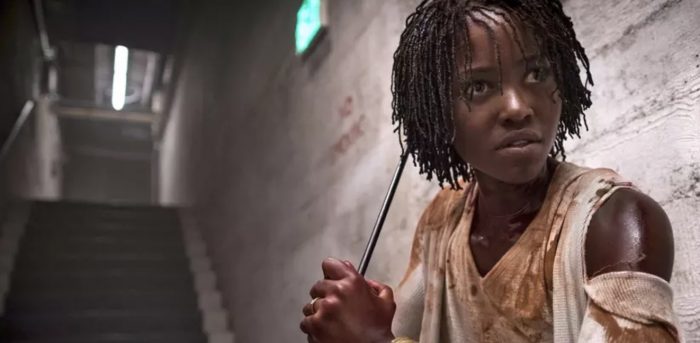Imposters Among ‘Us’: Jordan Peele’s ‘Us’ uses villains as symbols for the classes of America
April 4, 2019
Disclaimer: The following contains spoilers for the film Us (2019).
Jordan Peele’s Us is a film totally unashamed of being a horror. More than anything, Us is Jordan Peele’s love letter to the horror films of his childhood.
If I had any picture of Jordan Peele in my head while watching this is would be him laughing behind the curtain along with Wes Craven and John Carpenter.
Advertisement
Us is a very different film than Get Out. Jordan Peele was following up a debut film which is an undeniable smash hit. Not only was it a smash hit, it was hailed as a sharp satire on white liberalism, and it also won Jordan Peele an Academy Award for Best Original Screenplay.
Where Get Out was more specific, Us is much more ambiguous. The differences don’t just end there: Us is a lot bloodier, sillier, bombastic, a lot of things Get Out is not, but it is very proud of these qualities.
It’s not to say Us is a dumber film – far from it. It doesn’t carry a sharp satire like Get Out, but it does have an allegory more subdued beneath its surface. The Tethered – mimicking a ‘Hands Across America’ style protest – are a symbol of the lower class.
The Tethered are hidden and forgotten in America’s abandoned tunnel systems. They were created by the government to control the citizens on the surface, but it was a failed experiment.
The Tethered were left to merely mimic those above, but with twisted results: Lupita Nyong’o’s character, Adelaide, has two loving children. But her tethered clone, Red, has painful, unwilling pregnancies.
They don’t have the privilege of feeling the warmth of the sun on their skin. They must follow the lives of the upper class but are forced to do them in horrific juxtaposition. The concept of The Tethered is fun to think about if you can carry a suspension of disbelief.
The film wonderfully embraces the ridiculousness of its situation to add more intrigue to the mythos and thoughts about its themes and statements.
Advertisement*
However, Us brings everything full circle with its closing moments. Throughout the film, we are shown flashbacks to Nyong’o’s childhood. She had a traumatic encounter with her doppelganger in an amusement park mirror maze – only for it to reveal in the end Adelaide is the doppelganger from the flashback who swapped roles with Red, the original Adelaide.
It became clear what the movie’s hidden narrative is before the first attack in the film: Gabe and Adelaide get ready for bed when Adelaide busts out a confession about her past trauma closing with the words “I feel like she’s still coming to get me.”
This reveals not only the regret of the swap she made as a child, but shows the fear Adelaide is eventually going to face the consequences of her actions. As the film progresses, Adelaide shows more animalistic tendencies while also making The Tethered more sympathetic.
It says a lot about how getting to the upper class status quo could involve doing very unethical things, but also there are millions of other Americans who peruse unethical ways as well to improve their social status.
Even with the final confrontation, Adelaide must do what she can to protect her own children so she kills the person whose life she literally stole decades earlier.
Adelaide is, by all means, an imposter. Her costume is even splattered with blood more and more as the film goes on, blending more with The Tethered’s red attire as the ultimate reminder of where she came from.
It talks about the role of the imposter in American identity politics. How individuals fear having to face the repercussions of their own privilege, and stoop to the level of who they’re trying to avoid becoming.
Us gives a thought-provoking allegory on class through stabbings, scares and secrets. It uses the mass appeal of well-paced horror to give a cautionary tale to a wide audience who’ll hopefully think critically of America’s class system.
Guest writer Trevor Leavell can be reached at [email protected].
To stay up to date with all your southern Illinois news, follow the Daily Egyptian on Facebook and Twitter.
Advertisement







